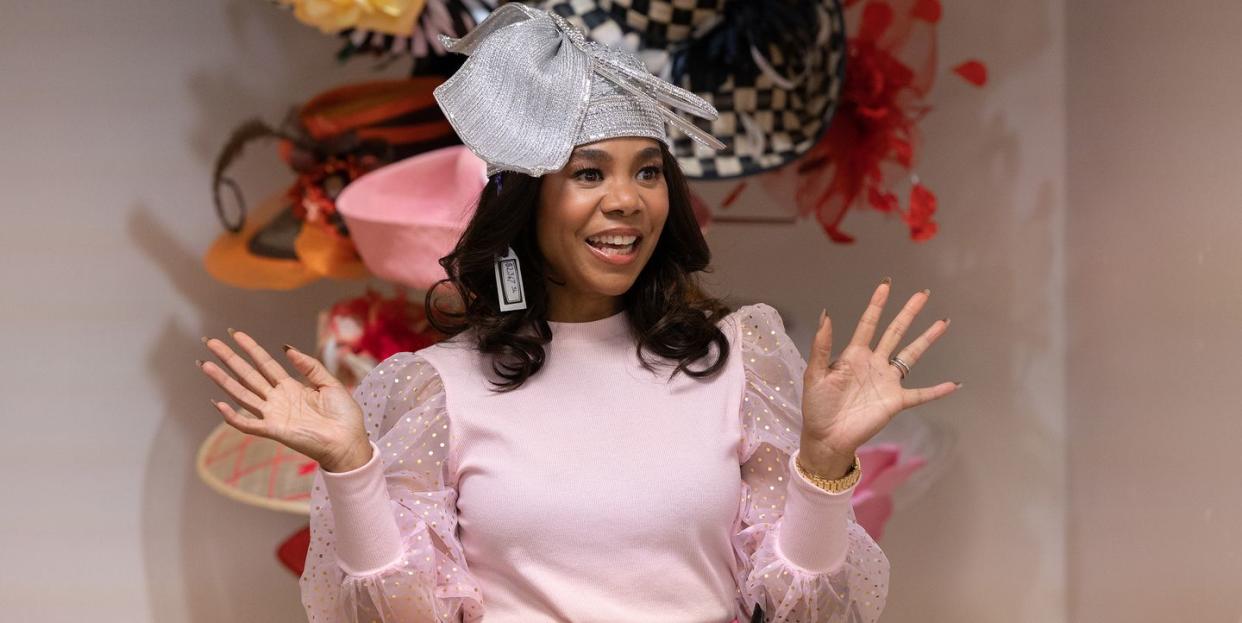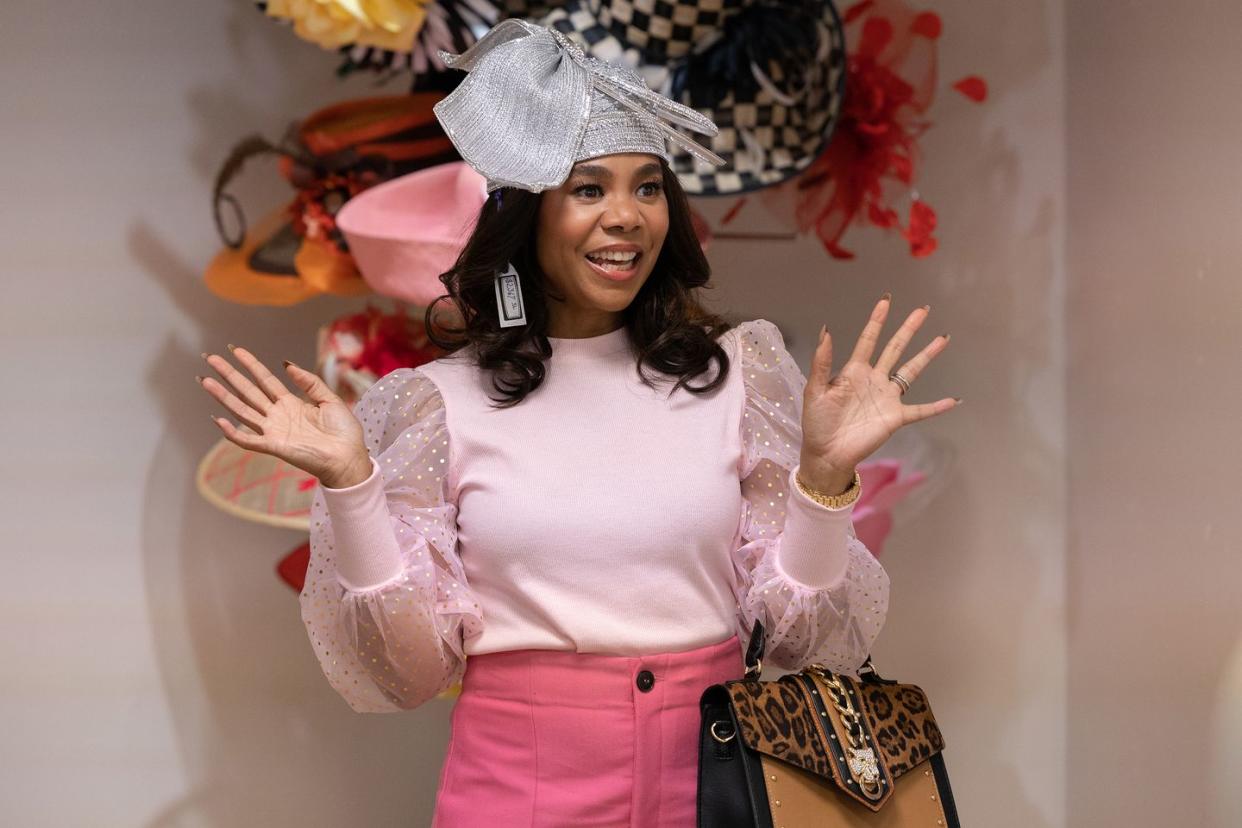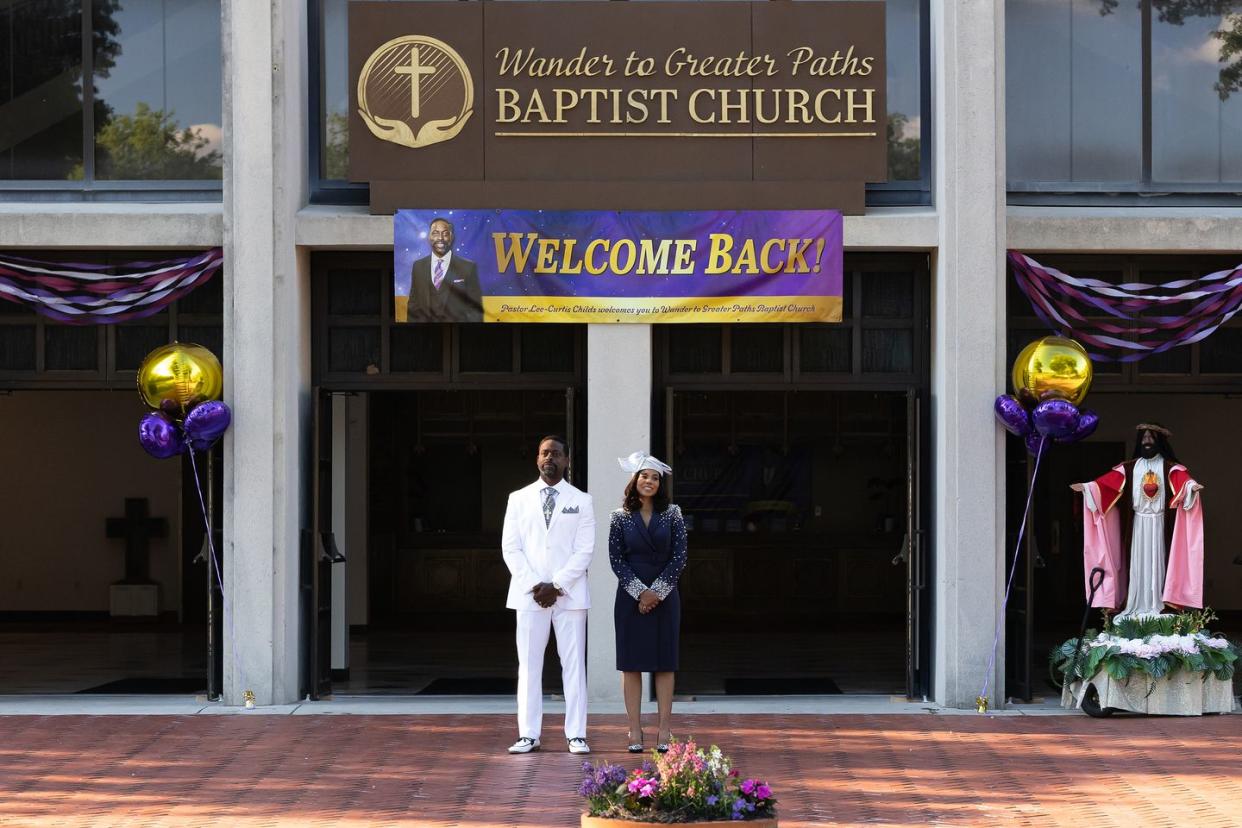Regina Hall Is Not Your Average Church Lady in 'Honk for Jesus. Save Your Soul.'

Throughout Adamma and Adanne Ebo’s new mockumentary film, Honk for Jesus. Save Your Soul., Trinitie Childs is tested. Played by Regina Hall in a career-pinnacle role, the first lady of a Southern megachurch facing a congregation-diminishing scandal, Trinitie is a devoted wife who does what she can to get her flamboyant husband, Pastor Lee-Curtis Childs (Sterling K. Brown) into the pulpit, including baptizing, praise miming (yes, you read that right), and dancing by the road asking drivers to honk for Jesus. She may have reservations in private, but in public, she saves face and dismisses the haters with a simple, “Bless your heart.”
“You see her out there trying to shake it for the Lord, but Trinitie can’t dance. Neither can Regina for that fact,” Hall tells BAAZAR.com over video chat, laughing as she remembers the stunts she portrayed as the dedicated first lady. Hall has worked for decades as a beloved comedic actress and underappreciated dramatic force, sides that come into perfect balance in the Ebo twins’ social satire about the showmanship, greed, and hypocrisy seen in megachurch culture. She masterfully handles Trinitie’s story as a woman who can both evoke and repel sympathy with her absolute need for control.
Hall knows that different viewers will have different takeaways from Trinitie and Lee-Curtis’s dissonant image of anointedness, from their massive closetful of Prada to the moments that show the strain within their partnership. She also knows that not everyone will find humor in its satirical spotlight on the Black church. “I’m sure we’ll have some backlash from churchgoers. You don’t make a film like this without knowing that possibility is there, but I think you make it in spite of that because you believe in it. [The Ebo sisters] love the church. I love things about the church, so does Sterling, but it’s not an infallible institution.”
Below, Hall speaks further with BAZAAR.com about the fun that goes into filming a mockumentary, Trinitie’s role as a first lady, and the new cohort of up-and-coming female filmmakers.
What made you excited to take on this role in a social satire?
The title made me read it. I was like, what is Honk for Jesus? I like taking swings with materials and not knowing, but I thought this is really interesting, and if it works, it could be special. For me, that was worth a yes.
Then, of course, I watched the short film, which I so enjoyed, and I met the Ebo twins. I thought, "Who are these smart, funny, fascinating young women? You know what, let's try this."
In Trinitie and Lee-Curtis's relationship in the film, there's the on mode with the documentary scenes, but then there's also the private moments where they're not being filmed. How did you work with Sterling on deciding on their dynamic when they're on versus when they're in private?
I think that's the great thing about the setup of the film. When that camera's on and they know, they are really performing. They're ready for the comeback, and there is joy. In their private moments, you can see Trinitie's concern about where this could go. You have the bedroom scene where you see where they're really disconnected in an important part of a relationship. They have so much love, and yet there's an intimacy that's missing.
Then you see them being a little ratchet with "Knuck If You Buck." It's like their true selves where you see that they're afraid of this new church, the issues in their own relationship, and the issues in Lee-Curtis's compulsions. You see where Trinitie has thoughts of leaving the relationship, but you see an ultimate commitment to God, I believe. Certainly, they believe they are committed to that.
Also, the mockumentary style is so interesting, because it adds another layer of seeing how they want to control the entire situation and their perception, but it's a documentary. You can't.
Lee-Curtis thinks that he can control the narrative. I think Trinitie thinks it's a bad idea, but Trinitie seems to think she can control Anita [the documentary's director]. It's too late for all of that. I don't think that either of them fully understands what a documentary is, certainly not Lee-Curtis. It's not to put out the truth. It's to discover it, so whatever they discover is then what they put out.
How was it as an actor to play those scenes where you're trying to control the director?
So much fun. It was interesting to figure it out. There's the technical part—when I'm looking in the real camera, they're also filming a fake camera in front of us that's a part of the documentary crew. So we had that crew, and then the different points of view. It's specific, but for Sterling and I, we had a ball, 'cause I'd be like, "Where do I look?" That documentary camera is where she puts the smile back on. Especially in scenes like [in the mall] with Sister Denetta, she wants [the documentary crew] to go so she can have that moment. When they're back, she's gotta pretend. Whenever it slips, she goes right back for the camera. That was fun to be able to stay in that moment, but then to show that Trinitie is trying so hard.
I also have to ask about the fashion. Even beyond that wild scene of Trinitie and Lee-Curtis just showing off their closet, the pantsuits are amazing throughout this entire movie. What about the costumes helped you most with getting into that Trinitie mindset?
Talking about that with Lorraine [Coppin], our costume designer, was so great. We were like, Trinitie's progressive enough to wear pants [day to day]. Not in the pulpit, or as first lady, but the pants felt like she was a modern-day first lady. It helped a lot getting into character.
I thought about how much money they spent on clothes in another part of the documentary. They just love talking about how much Prada is in there, and [showing off] their cars, and pointing to the sign that says, "Stay Humble." That was the show, like, "Look, even with all this, we're so humble," as they're dancing in that closet and showing the hats. That was important, and it was still revelatory that they had so much fun.
I think for them that idea of prosperity was really important to show God's blessing through all of their things, that they were in God's will 'cause they had too much. So I loved picking out the clothes, the hats. I loved them showing that price tag on that hat and [saying it's] spider silk. What is spider silk?

There is a lot to examine within that first lady role. In the trailer, Trinitie has the interesting quote, "I did what I was supposed to do." There are those moments where she has to lower herself to try to get Lee-Curtis back in the pulpit. How much of her actions come from actually wanting to help this man preach, and how much are for the societal expectations and the ostentatious life she wants to keep?
[There's] something that she says [to Lee-Curtis in the film]. She says that he's gotta get back on that pulpit, and she needs to get back on that stage. She enjoys the stage. She feels like she's invested a lot in Lee-Curtis and in building that church. It is as much hers as it is his. She says, he's the face and head, but she is the neck [and] spine. She is an integral part of that system.
I don't think the methodology would've been the same [if she were leading]. I don't think she would've come up with a roadside ministry. She does feel he is the head of that congregation and the head of their household, but I think that she has as much vested interest as Lee-Curtis in getting the church back, emotionally, financially, and in connection to her self worth. I don't think she would've felt the need to diminish herself. She wouldn't have had a documentary film crew. There's a lot that she would've done differently, but she allowed it. I think part of that was thinking that it is her duty as a wife and a first lady. That is what she's signed on for, and if this is what her husband wants to do, then her role as a first lady publicly and privately was to acquiesce and support her anointed husband.
It's been a while since the film premiered at Sundance. Have there been any conversations you've heard around the uncomfortable truths the film illuminates about this Southern megachurch culture? Are there any conversations you hope audiences have after seeing this film?
I don't think we have yet because Sundance was more of a limited audience. I think once it actually goes into release, the masses are seeing the trailer and they think it's a comedy and it's gonna be really funny. It does have moments that make you laugh, but I don't know if they're expecting the other stuff that's gonna come with it.
The intention is certainly not to disparage the church. The intention is to, if anything, expose where there could be growth and expansion in thinking, where there could be evolution. I hope people talk about that. I think everyone will take away something different. Some people will really focus on the relationship between two of them. Some people will talk about prosperity in the church. Some people will talk about the theme of homosexuality and how the church views that. So I don't know.
I think that's what I liked about the film. I like films that are thought-provoking. I'm sure we'll have some backlash from churchgoers and the church. You don't make a film like this without knowing that possibility is there, but I think you make it in spite of that because you believe in it. [The Ebo sisters] love the church. I love things about the church, so does Sterling, but it's not an infallible institution.

What do you think about the state of the industry for Black filmmaking going forward and getting these types of stories made that explore unique dynamics within the Black community? What do you think about the future of telling those types of stories on the big screen?
I think megachurches are universal. There have been big Christian megachurches and white pastors that have fallen from grace. I think how every culture experiences church is different, and the stuff that goes on in the Black church is real. But I do think that it's also universal. That's really important, because our stories are universal stories, but it's also beautiful when it's rich and steeped in culture. I don't think unique stories are easy to tell. I think Master was one of those stories, too, because it had a point of view that was really honest in a genre that you really didn't expect. I don't think many people think of a satire in the church, but it's interesting and it's necessary.
I think those stories have to be told. It's important for us to see ourselves telling those stories and have people like the Ebo twins and Mariama Diallo write and direct those stories. I think it's important for everyone to see Black people as humans and what we go through like anyone else: sadness, pain, despair, great joy, deep humanity, laughter … everything that everyone else does. So it's a joy and a pleasure to see up-and-coming talented filmmakers. It's also wonderful to see women telling bold and honest stories, and directing them from that vantage point. I hope to do more.
This interview has been edited and condensed for clarity.
You Might Also Like
